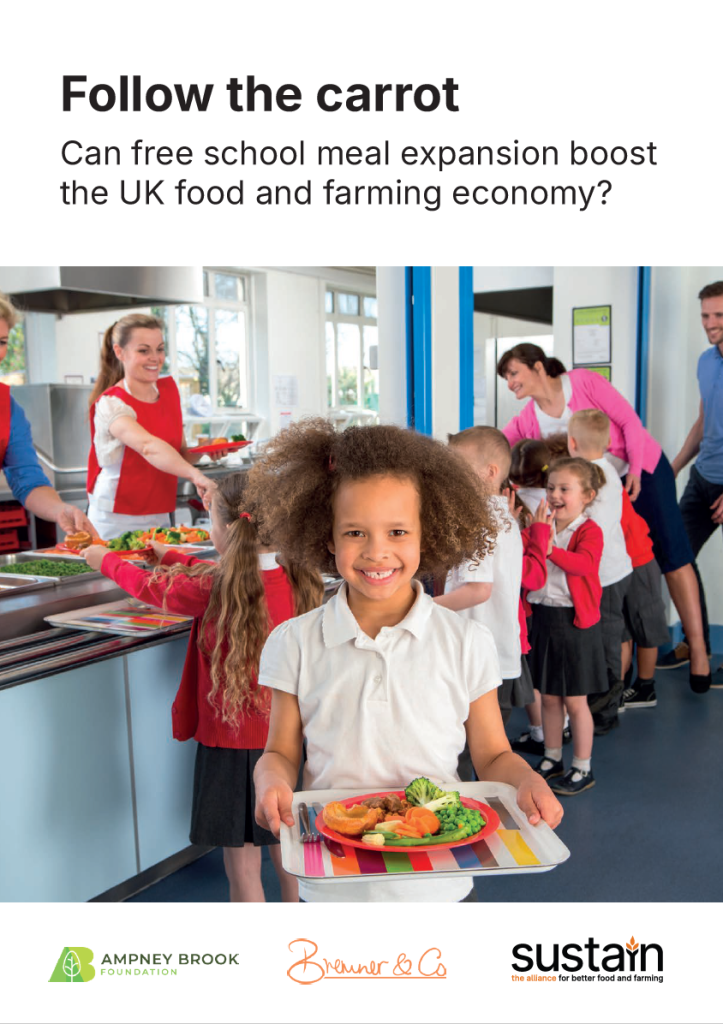Today we’re publishing Follow the Carrot, the final report for our research that asked a simple question: could expanding free school meals also strengthen the UK food and farming economy?
Our analysis suggests the answer is yes, if expansion is matched with the right conditions for success.

Commissioned by Sustain and with support from the Ampney Brook Foundation, we explored whether higher meal uptake could create greater demand for fresh British produce, and whether that demand could translate into economic value for UK farming.
We focused on a handful of staple ingredients; all popular with children, grown widely here in the UK, and capable of scaling up. We wanted to know whether if schools bought more of these ingredients, what would it mean for growers, supply chains, and children’s diets?
Key findings
With just 12 months to go until all children in households receiving Universal Credit in England become eligible for free school meals – benefitting an estimated 620,000 more children in the first year – our analysis shows this policy could transform not only children’s health and education, but also Britain’s food and farming economy.
Schools already serve over a billion meals every year. The upcoming Universal Credit expansion will add around 70 million more. Expanding to universal school meals could be a game-changer for both children and British farming, increasing the number of meals served each year from 1 billion to a whopping 1.54 billion – an extra 540 million plates of food! This expansion could deliver a £600 million boost to British farming. This could include 1,540 extra lorry-loads of carrots, or 7.8 million more sacks of potatoes, or 1.3 billion florets of broccoli served to children across the country. The opportunity is clear.
As our CEO, Myles Bremner, said on BBC Radio 4’s Farming Today programme, “it’s this perfect win-win-win. It’s good for children’s health. It’s good for sustainability… It’s good for the economy as well.”
However, this opportunity can’t be realised without fairer funding, investment in skills and kitchens, and stronger standards and monitoring throughout the system.
We thank the many caterers, farmers, campaigners and policymakers who gave their time and knowledge, and to Impact on Urban Health for their support.
Across every conversation the message was consistent: school food and farming policy cannot sit in silos, and a joined-up approach is needed to make this win-win happen for children’s health and British farming.
The good news is that producers and growers across the UK told us that they are ready to scale up and supply our schools and more of the public sector. But what they want is a level playing field to be able to do that.
Myles Bremner, on BBC Radio 4
Five recommendations for government
That is why Follow the Carrot makes five recommendations:
- Unlock growth for UK producers by continuing expansion towards universal school meals.
- Fund school meals properly to reflect the true cost of quality and invest in supply chain infrastructure.
- Raise standards and enforce compliance to ensure nutritious, sustainable food in every school.
- Scale up proven local models that deliver benefits for both children and farmers.
- Join up strategies across health, farming and the economy to maximise the impact of public food spending.
Join the webinar
On 23 September (12–1pm) we’ll be hosting a webinar to explore what this opportunity means for actors across the school food supply chain. Our panel of experts will include:
- Jayne Jones (Chair, Public Sector Catering Alliance)
- Caroline Morgan (Local Food Links)
- Hannah Gibbs (Sustain/Bridging the Gap)
- Tom Simmons (Riviera Produce)
